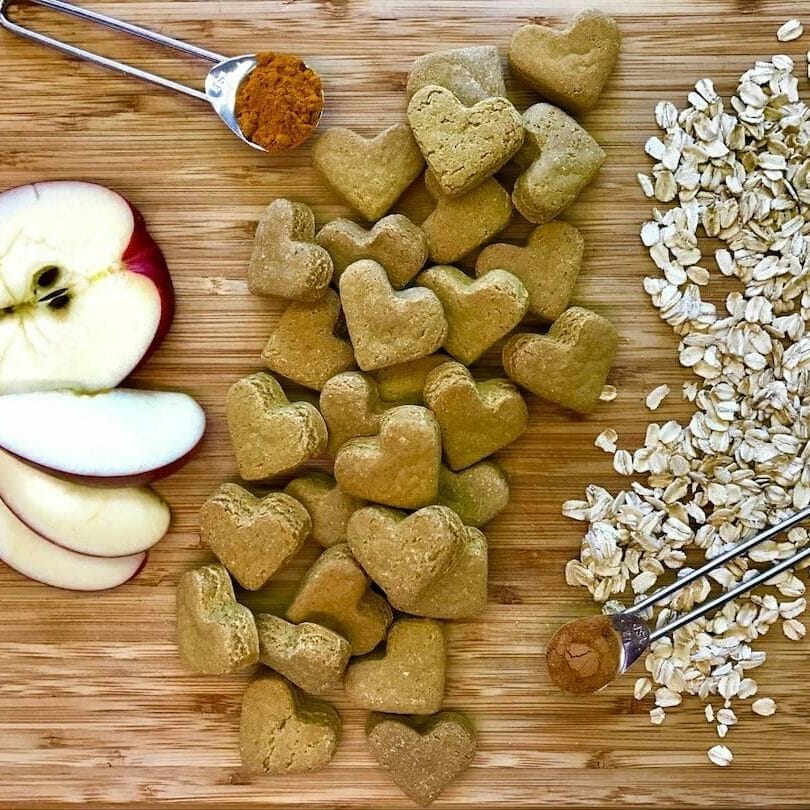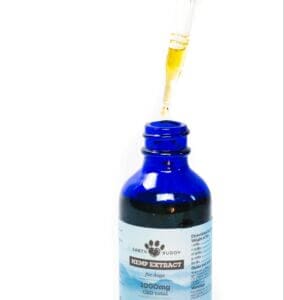While meat remains a staple in a dog’s diet, many fruits and vegetables can provide beneficial vitamins and nutrients, contributing to a well-rounded and nutritious diet. On the other hand, there are others you should avoid completely, and others you simply need to use caution when feeding. The ultimate question is, what fruits and vegetables can dogs eat?
What Fruits and Vegetables Can Dogs Eat?
There are a variety of fruits and vegetables your dog can eat, but there are some you should watch out for. We’ll review which fruits and vegetables are safe for dogs, which are acceptable under certain circumstances, and which you should contact your veterinarian about if consumed.
Before we dive in, it’s important to note that fruits and vegetables should only be offered as an occasional treat added to your dog’s food regimen.
Safe Fruits Your Dog Eats
Fruits can offer a sweet treat and a nutritional boost for your pup. Here are a few that are safe and beneficial to your dog’s overall health that your dog owners can offer:
1. Apples Support Digestive Health
Apples can be a healthy and delicious snack for your dog, offering a variety of nutritional benefits. They’re low in fat and high in fiber, which can contribute to your dog’s digestive health and support proper weight management. Similar to other fruits, apples are also a good source of essential vitamins like vitamin A and vitamin C.
Vitamin A promotes eye health, while vitamin C acts as an antioxidant, combating harmful free radicals in the body. And the crunchiness of apples can help clean your dog’s teeth and freshen their breath. Always remember to remove the seeds and core before feeding apples to your dog, as they can pose a choking hazard, and the seeds contain cyanide, which is toxic to dogs.
2. Bananas as a Great Snack for Dogs
Bananas are a great snack for dogs due to their potential health benefits. They are rich in important nutrients, including potassium, vitamin C, vitamin B6, manganese, and fiber, which can support a dog’s overall health and well-being. Potassium is beneficial for heart and kidney functions; vitamin C acts as an antioxidant; and vitamin B6 helps support cognitive function.
Fiber, on the other hand, helps maintain a healthy digestive tract and supports normal bowel function. Additionally, bananas have a sweet taste that many dogs find appealing, making them a valuable tool in training or rewarding good behavior.
3. Blueberries For Dietary Fiber
Blueberries are incredibly beneficial for dogs and are a healthy snack, offering a range of nutritional perks. These small fruits are packed with antioxidants, which help eliminate free radicals associated with the aging process. They are also an excellent source of dietary fiber, which supports weight loss and a healthy appetite.
Blueberries contain vitamins C and K and a good amount of manganese, all of which contribute to various aspects of your pet’s health, including the strength of their immune system, bone health, and metabolism. Furthermore, the small, soft size of blueberries makes them a safe treat for dogs of all sizes, and dogs love their sweet flavor.
4. Watermelon For Added Hydration
Watermelons are a nutritious and refreshing treat for dogs, especially during the warmer months when hydration is particularly important. They are composed of about 92% water, making them a great way to help dogs stay hydrated.
Watermelons are rich in vitamins A, B6, and C, as well as potassium, all of which contribute to your dog’s overall health. Vitamin A supports skin and coat health, vitamin B6 enhances your pet’s brain function, vitamin C is an antioxidant that can help fight off harmful free radicals, and potassium is important for muscle and nerve function. Watermelons are also low in calories and fat, making them a healthy snack choice. Only feed the flesh. The rind can cause blockages and stomach upset.
What Vegetables Can Your Dog Eat?
Feeding your dog vegetables may seem odd, but vegetables can be a healthy addition to your dog’s diet. Some dog foods, like those involved in the BARF diet, even call for a small percentage of veggies. Here are some safe vegetables dogs can benefit from:
1. Carrots As a Low Calorie Snack
Carrots are a fantastic addition to a dog’s diet, offering a multitude of health benefits. They are low in calories and high in fiber, making them an excellent choice for dogs who need to maintain a healthy weight. Carrots are also a good source of vitamins A, C, and K, as well as potassium.
Vitamin A, which is abundant in carrots, helps maintain normal eye function and health, helps animals achieve a soft, silky, shiny, and healthy coat, and promotes immune function. They’re a crunchy snack, like bell peppers, that can benefit your dog’s dental health by naturally cleaning the teeth and gums as they chew.
2. Green Beans for Vitamins C and K
Green beans are a wonderful addition to a dog’s diet due to their rich nutritional profile and low calorie count. They are high in fiber, which can support healthy digestion and help maintain a dog’s weight by providing a feeling of fullness without adding unnecessary calories.
Green beans are also packed with important vitamins and minerals, such as vitamins C and K, manganese, and beta-carotene. Vitamin C is an antioxidant that can help protect your dog’s cells from damage, vitamin K enhances red blood cell life span, and manganese is important for bone health.
Beta carotene is a precursor to vitamin A, which supports vision, growth, and immune health. Because they’re low in fat and easy to digest, green beans can be a great treat for dogs, particularly those that are overweight dogs that could lose a few pounds or have certain dietary restrictions. You can also mix in some fresh or frozen peas for added nutritional value.
3. Sweet Potatoes For Your Dog’s Health
Sweet potatoes are an excellent source of dietary fiber, which aids in the digestion and absorption of essential nutrients. Sweet potatoes are also packed with vitamins A, C, and B6, along with minerals like manganese, potassium, and calcium, all of which contribute to various aspects of a dog’s health.
Vitamin A is essential for maintaining and supporting normal visual function; vitamin C supports the dog’s immune system; and vitamin B6 supports brain development and function. Manganese aids in bone development and the metabolism of carbohydrates, proteins, and fats, while potassium supports heart health and muscle function. Mix in leafy greens like kale to this sweet treat most dogs love for more nutrients.
4. Raw or Pureed Pumpkin for Digestion
Pumpkin is an excellent food for dogs due to its high nutritional value and versatility. It is rich in dietary fiber, which aids in promoting your dog’s digestive system. This makes it especially beneficial for dogs with digestive issues, as it can help regulate bowel movements. Pumpkin is also packed with beneficial nutrients like vitamins A, C, and E, beta-carotene, and potassium.
Vitamin A supports vision and immune health, vitamin C acts as an antioxidant;, and vitamin E supports your dog’s skin health. Beta-carotene is a powerful antioxidant that converts to vitamin A in the body, while potassium supports heart health.
Pumpkin is low in fat and cholesterol, making it a healthy treat for dogs. However, it should be served cooked and without any added sugar or spices (like those found in pumpkin pie filling), and as with any food, it’s important to give pumpkin to your dog in moderation.
Fruits and Veggies to Avoid
While some fruits and vegetables can be beneficial for dogs, others can be harmful or even fatal. It’s essential to know which ones to avoid to ensure your dog’s health and wellbeing. Below, we will discuss some fruits and vegetables your dog should steer clear of.
1. Grapes and Raisins Are Always Toxic
Grapes and raisins are extremely toxic to dogs and should never be fed to them under any circumstances. The exact substance that causes toxicity in grapes and raisins is still unidentified, but even small quantities can cause serious health problems. It’s crucial to understand that there’s no safe quantity or type of grape or raisin for dogs to consume; all varieties and forms (including those found in baked goods or other foods) are dangerous.
2. Avocados Contain Persin
Avocados are generally not recommended for dogs due to a compound they contain called persin, which can be toxic to dogs in large quantities. While most of the persin is concentrated in the avocado’s pit and skin, it’s still safer to avoid avocados altogether, given the risk.
The pit presents a significant choking hazard and, if swallowed, can cause a blockage in the gastrointestinal tract, a situation that requires urgent veterinary attention. It’s also worth noting that avocados are high in fat, and too much fat can lead to health issues.
3. Cherries Are Toxic
Cherries pose several risks to dogs and are generally considered unsafe to feed them. The pits, stems, and leaves of cherries contain cyanide, a toxic substance that can lead to cyanide poisoning in dogs.
While a small amount of cherry flesh might not be harmful, it is typically not worth the risk, given the danger of the other parts of the fruit. Furthermore, cherry pits can cause intestinal blockages, especially in smaller dogs, due to their size and hardness. This can lead to severe digestive issues requiring veterinary intervention.
4. Citrus Fruits Contain Too Much Sugar
While the fleshy part of citrus fruits like oranges or tangerines isn’t toxic to dogs, it’s generally best to avoid feeding them these fruits due to their high acid and sugar content. Consuming large amounts of citrus can be problematic for your dog’s health.
The danger that the citrus fruit’s other parts might pose, however, is more concerning. The peel, leaves, stems, and seeds of citrus fruits contain varying amounts of citric acid, essential oils, and a compound called psoralens, which is toxic to dogs.
5. Eating Onions Can Be Extremely Dangerous
Onions, along with other members of the Allium family like garlic, leeks, and chives, are highly toxic to dogs. They contain a compound called N-propyl disulfide, which is toxic to your dog. The toxicity can occur from both raw and cooked onions, regardless of their form (whole, powdered, or within food). Even small amounts can cause toxicity, and the effects are cumulative, meaning they can add up over time.
Instead of onions, offer your dog some bell peppers. Be sure to add them in bite-size pieces to avoid the hazard of choking.
6. Raw Potatoes Contain Solanine
Feeding raw potatoes to your dog is not recommended due to the presence of solanine, a compound that is toxic to dogs. Solanine is most concentrated in the green parts of the potato and the sprouts, but it’s present throughout the raw potato.
Additionally, raw potatoes are tough and can be difficult for dogs to digest, possibly leading to choking or intestinal blockages. If you choose to feed your dog potatoes, they should always be cooked (boiled or baked) and served without any added butter, salt, or other potentially harmful seasonings.
7. Keep Macadamia Nuts Out of Reach
Macadamia nuts are highly toxic to dogs and should be strictly avoided. While the exact cause of toxicity is currently unknown, consumption can lead to a series of adverse reactions, with one of the initial symptoms being an upset stomach and worsening from there.
If your dog has consumed macadamia nuts, even if they’re the most healthy dogs you know, immediate veterinary attention is necessary. To prevent accidental ingestion, always keep macadamia nuts and foods containing them stored safely out of your dog’s reach.
Use Caution With These Foods
There are a couple of foods that should be addressed because, while they can be highly beneficial, they should be fed with caution.
1. Use Caution With Wild Mushrooms
While not all mushrooms are toxic to dogs, and some can be quite beneficial, it’s generally best to avoid them if you aren’t familiar with which store-bought or wild mushrooms are appropriate due to the significant risks posed by certain types. Many varieties of wild mushrooms contain toxins that can cause a range of harmful effects in dogs, depending on the species.
Medicinal mushrooms are another story, but the product should be carefully vetted prior to purchase since the world of supplements is highly unregulated. If you’re searching for a high-quality medicinal mushroom product dogs can eat as a supplement, Earth Buddy uses both fruit body and mycelium for a full spectrum of compounds bioavailable to your dog. Earth Buddy’s products are also tested for purity and potency, with lab results available to the public.
2. Tomato Plants Must Be Ripe
While your dog can safely eat ripe tomatoes in small amounts, there are some important caveats to consider. Green, unripe tomatoes, as well as the plant’s leaves and stems, contain a toxic substance called solanine.
Although the amount of solanine in a ripe tomato is much less, it’s always a good idea to exercise caution and only feed small amounts to your dog to prevent any potential stomach upset from the acidity of the fruit. As with any food, tomatoes should be given in moderation and should not replace a balanced diet.
3. Brussel Sprouts
Brussels sprouts contain antioxidants and helps support the immune system, which can help support your dog’s overall health and immunity. However, due to their high fiber content, they should be introduced slowly and given in moderation to prevent any potential digestive discomfort. Always ensure they’re cooked to ease digestion and served without any harmful seasonings.
For further reading, we recommend:
- https://onlinelibrary.wiley.com/doi/10.1111/jvim.15884
- https://www.ncbi.nlm.nih.gov/pmc/articles/PMC2984110/
- https://pubmed.ncbi.nlm.nih.gov/18307506/
- https://pubmed.ncbi.nlm.nih.gov/26392037/
- https://pubmed.ncbi.nlm.nih.gov/12392784/
- https://journals.sagepub.com/doi/abs/10.3181/00379727-31-7352C
- https://pubmed.ncbi.nlm.nih.gov/31035474/
You Might Also Enjoy
Understanding the differences between hemp vs CBD oil is important to produce the outcomes you’re…
The interest in natural options for promoting pet health has seen a significant rise, with…
Reactive dog barking may sound intimidating, but it’s important to differentiate it from dog aggression.…





